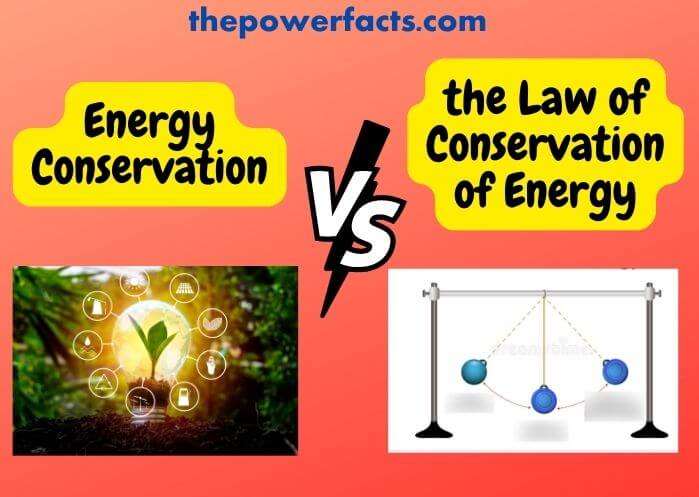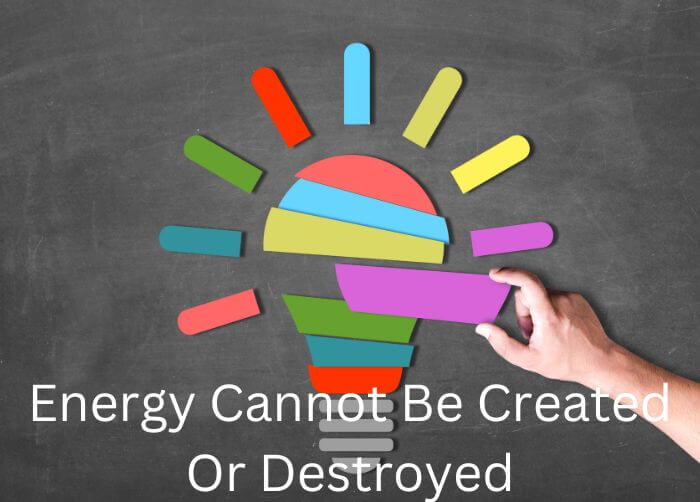The law of conservation of energy is one of the basic laws of physics and states that energy can neither be created nor destroyed. Energy conservation, on the other hand, is a term used to describe the deliberate actions taken to reduce energy consumption. While the two concepts are closely related, they are not the same.

The law of conservation of energy is one of the most fundamental laws in physics. It states that energy can neither be created nor destroyed, but it can be converted from one form to another. Energy conservation, on the other hand, is the practice of using less energy to achieve the same result.
For example, turning off lights when you leave a room is an act of energy conservation.
While the law of conservation of energy is a scientific principle that governs all forms of energy, energy conservation is a voluntary effort to reduce our consumption of resources. By reducing our demand for energy, we can help conserve resources and protect our environment.
How the Law of Conservation of Energy is Different from Energy Conservation?
The law of conservation of energy is one of the most fundamental laws in physics. It states that energy can neither be created nor destroyed. The only thing that can happen to energy is that it can be converted from one form to another.
This law is different from energy conservation, which is the idea that we should try to conserve energy.
| Energy conservation | The law of conservation of energy |
| Energy conservation means using less energy or using it more efficiently. | The law of conservation of energy doesn’t say anything about how we should use energy. |
| Turning off lights when you leave a room is an example of energy conservation. | It just says that energy can’t be created or destroyed. So, even if we are wasting a lot of energy, it’s still there – it’s just in a different form (like heat). |
| Energy conservation is more of an ethical principle. | The law of conservation of energy is a scientific law |
What are the Laws of Conservation And Energy?
The First Law
Laws of conservation of energy state that energy can neither be created nor destroyed, but it can be converted from one form to another. The total amount of energy in the universe remains constant, even as it changes form. The first law is also known as the principle of energy conservation.
The Second Law
The second law of thermodynamics states that when energy is converted from one form to another, some of it is always lost in the form of heat. This heat is a measure of the entropy or disorder of a system. The second law explains why systems tend toward disorder over time—why they run down and eventually stop working.
It also sets limits on how much work an engine can do and how efficiently it can convert fuel into useful work.
What is the Difference Between Energy Conservation?
When it comes to energy, there are two key ways to save: energy efficiency and energy conservation. Both strategies can help reduce your energy consumption and save you money, but they work in different ways.
Energy efficiency improves the way your home or business uses energy by using less to achieve the same goal.
For example, upgrading to more efficient lighting or appliances can help use less electricity overall without sacrificing productivity or comfort. Energy conservation refers to reducing your overall energy use, often by making simple changes in your daily habits. For instance, turning off lights when you leave a room or carpooling instead of driving alone are both easy ways to conserve energy.
So, which is better? The answer is both! By incorporating both strategies into your life, you can maximize your savings and make the biggest impact on reducing your carbon footprint.
Is Conservation of Energy the Same As Energy Conservation?
No, the conservation of energy is not the same as energy conservation. Energy conservation is a process or action that results in the reduction of energy consumption, while conservation of energy is a law of physics that states that energy cannot be created or destroyed.
State the Law of Conservation of Energy
In physics, the law of conservation of energy states that the total energy of an isolated system remains constant—it is said to be conserved over time. This law is a direct consequence of the fact that the laws of physics are time-reversible. The total energy includes both kinetic energy, which is the energy associated with motion; and potential energy, which is stored energy due to an object’s position within a gravitational field or its elasticity.
How is the Law of Conservation of Energy And the Law of Conservation of Mass Similar?
The law of conservation of energy and the law of conservation of mass are both laws that govern the behavior of matter and energy. These laws state that matter and energy cannot be created or destroyed, but only transformed from one form to another. The two laws are similar in that they both describe the behavior of conserved quantities.
However, there are some key differences between the two laws.
The law of conservation of energy is a more general law than the law of conservation of mass.
What is Energy Conservation?
As our population grows, so does our demand for energy. To sustainably meet this demand, it’s important that we conserve the energy we have. Energy conservation is the practice of using less energy to achieve the same result.
This can be done through simple changes like turning off lights when you leave a room or more significant changes like upgrading to energy-efficient appliances. There are many benefits to conserving energy.
- It can help save money on your utility bills, reduce greenhouse gas emissions, and decrease our reliance on fossil fuels.
- Additionally, it can help prolong the life of your appliances and equipment. Making small changes in your daily routine can add up to big savings over time.
Here are some easy ways to conserve energy:
| Step 1 | Turn off lights when you leave a room |
| Step 2 | Use natural light whenever possible |
What is the Difference Between the Law of Conservation of Mass And the Law of Conservation of Matter?
The law of conservation of mass and the law of conservation of matter are two very important laws in science. These laws state that matter can neither be created nor destroyed. This means that the amount of mass or matter in a closed system will always remain the same.
So what is the difference between these two laws? The main difference is that the law of conservation of mass applies to all forms of matter, while the law of conservation of matter only applies to physical matter. This means that the law of conservation of mass also includes energy, whereas the law of conservation does not.
Both these laws are extremely important in understanding many different phenomena in science. They help us to understand how chemical reactions work, how energy is conserved, and how our universe works on a fundamental level.
State the Law of Conservation of Energy Class 9
The law of conservation of energy is one of the most important laws in physics. It states that energy can neither be created nor destroyed. This means that the total amount of energy in the universe is always constant.
The law of conservation of energy is often used to solve problems involving energy changes in systems.
What are the 3 Laws of Conservation of Energy?
In physics, the law of conservation of energy states that the total energy of an isolated system remains constant—it is said to be conserved over time. This law is a direct consequence of the fact that the laws of physics are time-reversible. The total energy includes both kinetic and potential energies; therefore, conservation of energy also means that when no net work is done on or by the system, its kinetic and potential energies do not change.
The general form of the law can be expressed as: E_\mathrm{total} = \mathrm{constant} or \Delta E_\mathrm{total} = 0. A consequence of the law of conservation of energy is that a perpetual motion machine of the first kind cannot exist because it would violate one or more other laws such as thermodynamics (the second law in particular).
State the Law of Conservation of Energy With Example
The law of conservation of energy is the fundamental principle of physics that energy cannot be created or destroyed; it can only change form. The total amount of energy in a closed system remains constant over time. This means that if you add up all the forms of energy in a system, they will always equal the same amount.
For example, when you ride a bike, your legs push against the pedals to make the wheels go around. You are doing work on the bike and transferring energy to it. But eventually, your legs get tired and you have to stop pedaling.
Where does the energy go? It doesn’t just disappear—it has to go somewhere! In this case, it turns into heat as your body warms up from doing exercise.
The law of conservation of energy is often called the first law of thermodynamics because it is one of the most basic laws governing how heat (thermal energy) behaves. It is also closely related to the second law, which states that increased disorder (entropy) always accompanies a transfer or transformation of energy.
Energy Cannot Be Created Or Destroyed Which Law?

The law of conservation of energy is one of the most fundamental laws in physics. It states that energy cannot be created or destroyed, only converted from one form to another. This law is also known as the first law of thermodynamics.
This law has far-reaching implications for our understanding of the universe. It means that energy is a constant quantity and that it can never be increased or decreased. The total amount of energy in the universe is always the same.
This law also has important implications for how we use energy on Earth. We can never create more energy than we started with, but we can convert it from one form to another. For example, we can burn fossil fuels to release chemical energy, which can then be used to power cars or generate electricity.
Conclusion
There is a big difference between energy conservation and the law of conservation of energy. Energy conservation is when you use less energy to do the same thing. For example, turning off the lights when you leave a room.
The law of conservation of energy is a law of physics that states that energy can not be created or destroyed, only transformed from one form to another.
Relevant Resources:
- If Energy Cannot Be Created Or Destroyed, Where Did It Come from?
- State And Prove the Law of Conservation of Energy Engineering Mechanics
- The Law of Conservation of Energy States That Energy Cannot Be Or Destroyed
- In an Electric Fan, Electrical Energy Changes Into the Mechanical Energy. True or False?
- What is Conservation of Energy in Chemistry? (With Details Explain)